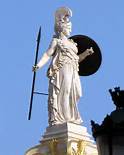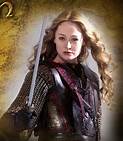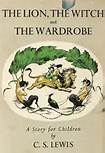What is SHE Doing Here?
 When I was growing up, Athena was my favourite goddess. What’s not to like? She springs fully-armed from the head of Zeus. She’s the goddess of Wisdom, as well as the goddess of War – oh, and the Liberal Arts. Except for that silly apple of discord episode, she’s the perfect role model for a young girl.
When I was growing up, Athena was my favourite goddess. What’s not to like? She springs fully-armed from the head of Zeus. She’s the goddess of Wisdom, as well as the goddess of War – oh, and the Liberal Arts. Except for that silly apple of discord episode, she’s the perfect role model for a young girl.
The thing is, when I was growing up, and there were only male heroes in the type of story I liked to read, it didn’t really bother me. When you have nothing else to compare it to, the world you have seems normal. For some reason, I didn’t feel excluded, nor did I feel that women couldn’t be the hero. I just thought no one had written those stories yet. See, all the writers seemed to be men, so I guess I figured that explained it. Certainly all the stories I made up to tell my friends had female leads. Swashbuckling, sword-wielding female leads.
Nowadays we tend toward using words like “protagonist” and “main character” rather than “hero,” and I think that’s to avoid the connotations that come along with the word. For some reason, when people say “hero,” they think it means some flawless gem of humanity. Well, maybe there were some of those, somewhere along the way, but if so, I never read about them. Every hero I’ve personally encountered, from Oedipus to Iron Man, is flawed – some even have a “tragic flaw” that results in their undoing.
Obviously, one of the connotations of that word “hero” is “masculine.” We even have a feminized version of the word, “heroine,” that some people avoid using because it’s a homophone for “heroin” and it makes them giggle when it’s said aloud. Okay, some weird people, but still.
I think the real reason we avoid the word “heroine” is that it brings with it the same kind of connotations we’d like to avoid as does the word “hero.” For a lot of women, the word “heroine” is normally prefaced with the adjective “romantic.” And as popular as Jane Austen might have become in the last little while, the word “romantic” is synonymous with the word “Harlequin” and is therefore an anathema to those of us writing in other genres.
Aside: I’ve published a romance novel, and I’m here to tell you that it’s just as hard to write a good one as it is to write any other book well. That being the case, I figured if I was going to work that hard, I’d like to work on something I prefer to read myself.
Of course, there were some female heroes around when I was growing up that I haven’t touched on. People like Supergirl and Batgirl, for example. But I never found them satisfying – to me, these women weren’t heroes in their own right; they were paler, sillier, more foolish versions of their male counterparts. In fact, they wouldn’t have existed without the guys.
So really, thank the gods for Wonder Woman. Almost the only female superhero who really was one. I don’t even seriously object to her costume. Are her physical features exaggerated? Sure. But then, so are Superman’s, and that doesn’t seem to bother anyone. At least, I’ve never heard anyone complain that real men don’t look like that. Well, okay, I’ve never heard men complain.
Sue Storm I felt ambiguous about. She had super powers – invisibility is pretty cool – and she was a hero in her own right. But didn’t she get married? Since that was never going to happen to me (yes, I see the irony), I had some difficulty relating to Sue as a character.
On the other hand, she was a real human being, not an alien, and not a sidekick. She was part of a team, which did imply that she wouldn’t carry the story alone, but Fantastic Four really ushered in a whole era of super-powered teams – many of mixed gender – seeming to imply that even the male hero wasn’t expected to carry the whole story anymore.
 Okay, that’s comic books. What about Fantasy and SF? I was eleven when I first read Lord of the Rings. I was really pleased with the character of Eowyn until she fell in love with Aragorn, then I felt like the grandson in The Princess Bride – disappointed that LOTR had turned into a kissing book. As I grew older, and reread LOTR (many times), I understood that her feelings were just one element in Eowyn’s character, and that I could still admire her as a hero. In fact, I could actually admire her more.
Okay, that’s comic books. What about Fantasy and SF? I was eleven when I first read Lord of the Rings. I was really pleased with the character of Eowyn until she fell in love with Aragorn, then I felt like the grandson in The Princess Bride – disappointed that LOTR had turned into a kissing book. As I grew older, and reread LOTR (many times), I understood that her feelings were just one element in Eowyn’s character, and that I could still admire her as a hero. In fact, I could actually admire her more.
There are female heroes that predate Eowyn, but not many. There’s Jirel of Joiry. There’s Red Sonja. There’s . . . okay, those are the only ones I can think of. But there are a couple of well-known female characters that people don’t often talk about in terms of their being heroes. I was eight when I first read The Chronicles of Narnia, which might have helped me to see that it’s really Lucy who is the main character of the early books, not Peter, Edmund, or even Susan. Susan, sadly, grows up to be an ordinary woman, which by the conventions of the times, meant she stopped being a hero. But Lucy didn’t. Even when she grew up, she was still Lucy the Valiant.
 In the later books, Lewis introduced Jill Poole, perhaps even more clearly a hero in her own right than Lucy was, if only because she shares the story with only one other main character. Jill’s fully an equal to and partner of Eustace, and their age allowed Lewis to avoid romantic complications, exactly as he’d done with Shasta and Aravis in A Horse and His Boy.
In the later books, Lewis introduced Jill Poole, perhaps even more clearly a hero in her own right than Lucy was, if only because she shares the story with only one other main character. Jill’s fully an equal to and partner of Eustace, and their age allowed Lewis to avoid romantic complications, exactly as he’d done with Shasta and Aravis in A Horse and His Boy.
By the way, this isn’t meant to be a wholesale endorsement of the Narnia books. There are quite a few things about them that make me wince today. But Lewis’s portrayal of Lucy, Jill, and Aravis isn’t one of them.
As I was saying last week, there are a lot more female writers of Fantasy and SF now, with a correspondingly higher incidence of female heroes. This is a long post already, so I’m just going to mention a few worthy names – by no means a comprehensive list, not even everyone I’ve read, just the people who come to mind without my getting up to consult my shelves: CJ Cherryh, Tanya Huff, Elizabeth Moon, Barbara Hambly, Jennifer Roberson, Michelle West, Martha Wells, Nalo Hopkinson, Julie Czerneda, Laura Resnick, Mercedes Lackey, Kari Sperring, Emma Bull, Tamara Pierce. And let’s not forget, in the interest of fair play, Charles de Lint, Tad Williams, and David Weber.
And finally, in answer to the question I ask in this week’s title: The same thing any hero does.
Violette Malan is the author of the Dhulyn and Parno series of sword and sorcery adventures, as well as the Mirror Lands series of primary world fantasies. As VM Escalada, she writes the soon-to-be released Halls of Law series. Visit her website www.violettemalan.com.
Thanks for the post.
Curious, what makes you “wince” with the Narnia books today?
Some of the Christian mythology feels really heavy-handed to me now, though obviously it didn’t when I was a child. I’m also well aware of how much worse it could be. I actually felt much better about it after I’d read Lewis’ book on Paradise Lost.
Love the examination Violette. Though I’d never thought of the heroine/heroin connection before, as improbable and inappropriate as it is.
“When you have nothing else to compare it to, the world you have seems normal. For some reason, I didn’t feel excluded, nor did I feel that women couldn’t be the hero.” I appreciate this as well; I’ve often wondered about that, a particular reader’s inability to identify with a hero. I’m a white male and while I do identify better with males, I don’t see myself as having any issue/difficulty with identifying with ANY hero that I connect with – male, female, white, not-white, human, orc, not-human. I either identify with a character or I don’t identify.
As for romance, I hear you on the instant mental connection with “Harlequin” or “Ewww” these days (as an aside the word ‘fantasy’ has almost reached that connotation as well), though I am a romantic (both senses of the word) at heart, and love the truly romantic novels. In fact (y’all knew I could bring him into any conversation, right?), I deem Steven Erikson’s massive Malazan Book of the Fallen one great romance and one of the greatest romances ever written. And fantasy series 😉
Thanks for making me post again, Violette.
Jason, like you, I either identify with a character or I don’t, and gender has little to with it. For me, it has more to do with how they look at the world — which gives me an idea for next week’s post, thanks.
As an 18th-century scholar, I’ve had a look at most of what’s often called the “pre-Romantic” writers, ie. those who came before Byron, Shelley, Keats, etc. so like you, I’ve no problem with the Romantic, nor do I have much trouble with the romantic, so long as it isn’t the main focus of the story.
The word Fantasy also has it’s ups and downs, as you suggest. Years ago, when I told my dentist I wrote fantasy, he automatically thought I meant erotica — which, as I pointed out, told me more about him than he’d intended.
Thanks for your comments, I always find them interesting.
“Years ago, when I told my dentist I wrote fantasy, he automatically thought I meant erotica — which, as I pointed out, told me more about him than he’d intended.”
Touche! I have GOT to remember to use that.